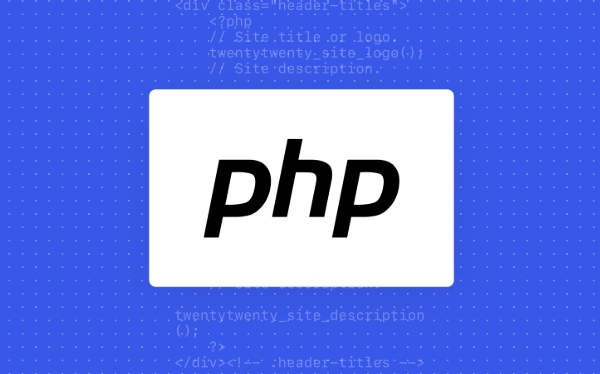 Backend Development
Backend Development
 PHP Tutorial
PHP Tutorial
 The Perils of Global State: Why You Should Avoid PHP's $GLOBALS
The Perils of Global State: Why You Should Avoid PHP's $GLOBALS
The Perils of Global State: Why You Should Avoid PHP's $GLOBALS
Aug 03, 2025 am 04:14 AMUsing $GLOBALS creates hidden dependencies, making functions harder to test, fragile, and unreusable; 2. It complicates unit testing by requiring global state manipulation, leading to slow, fragile tests; 3. Global state is unpredictable due to uncontrolled modifications, causing bugs and debugging challenges; 4. Code relying on $GLOBALS is less reusable and harder to refactor. Instead, use dependency injection, configuration objects, or service containers. Avoid $GLOBALS for data sharing—it undermines code quality, testability, and maintainability, and in most cases, it’s unnecessary.

Using PHP’s $GLOBALS superglobal might seem convenient at first—after all, it gives you access to all variables in the global scope from anywhere in your code. But relying on it introduces serious risks and long-term maintenance problems. While it’s a built-in feature and technically valid PHP, treating $GLOBALS as a go-to solution for sharing data across functions or files is a practice best avoided. Here’s why.

1. It Encourages Tight Coupling and Hidden Dependencies
When a function uses $GLOBALS, it silently depends on variables defined outside its scope. This breaks one of the core principles of clean code: explicit dependencies.
For example:

function calculateTax() {
return $GLOBALS['income'] * 0.2;
}At a glance, there’s no way to know this function relies on a global variable called income. This makes the function:
- Harder to test (you must manually set
$GLOBALS['income']) - Fragile (if
incomeisn’t set, it fails) - Unreusable (can’t easily use it with different income values)
Instead, pass dependencies explicitly:

function calculateTax($income) {
return $income * 0.2;
}Now the dependency is clear, testable, and flexible.
2. It Makes Testing Nearly Impossible
Unit testing relies on isolation. When your functions pull values from $GLOBALS, you have to manipulate global state before each test, which:
- Makes tests slower and more complex
- Risks test contamination (one test affects another)
- Breaks the principle of test independence
Imagine writing a test for a function that reads $GLOBALS['user_id']. You’d have to set that global value before each run and ensure no other test interferes with it. That’s fragile and error-prone.
With dependency injection, testing becomes straightforward:
function getUserData($userId, $database) {
return $database->fetchUser($userId);
}You can pass a mock database and any user ID—no global setup needed.
3. Global State Is Inherently Unpredictable
Global variables can be modified from anywhere. If multiple functions read and write to $GLOBALS['config'], you can’t be sure what value it holds at any given moment. This leads to:
- Heisenbugs (bugs that disappear when you try to reproduce them)
- Race conditions in long-running processes
- Difficulty debugging ("Who changed this value?")
This unpredictability grows worse as your application scales. A small script might survive global state, but a larger system will suffer from it.
4. It Hinders Code Reusability and Refactoring
Code that depends on global state is hard to move. You can’t just copy a function to another project—you must also bring along all the global variables it expects. This defeats modularity.
Additionally, refactoring becomes risky. Renaming or restructuring a global variable means hunting down every place it’s used via $GLOBALS, which static analysis tools often can’t track reliably.
Better Alternatives
Instead of using $GLOBALS, consider these more maintainable patterns:
- Dependency Injection: Pass needed values as function parameters or inject them into classes.
- Configuration Objects: Bundle settings into a config class or array and pass it where needed.
- Singletons (sparingly): If you truly need shared state, a well-defined singleton is more controlled than raw globals.
- Service Containers: In larger applications, use a DI container to manage and provide dependencies.
Bottom Line
$GLOBALS gives the illusion of convenience but at the cost of clarity, testability, and maintainability. While it has legitimate uses (like in very limited debugging scenarios), using it for general data sharing is a code smell.
Avoid relying on global state. Write functions and classes that are self-contained, predictable, and easy to test. Your future self—and anyone else who reads your code—will thank you.
Basically, just don’t use $GLOBALS unless you absolutely have to. And in 99% of cases, you don’t.
The above is the detailed content of The Perils of Global State: Why You Should Avoid PHP's $GLOBALS. For more information, please follow other related articles on the PHP Chinese website!

Hot AI Tools

Undress AI Tool
Undress images for free

Undresser.AI Undress
AI-powered app for creating realistic nude photos

AI Clothes Remover
Online AI tool for removing clothes from photos.

Clothoff.io
AI clothes remover

Video Face Swap
Swap faces in any video effortlessly with our completely free AI face swap tool!

Hot Article

Hot Tools

Notepad++7.3.1
Easy-to-use and free code editor

SublimeText3 Chinese version
Chinese version, very easy to use

Zend Studio 13.0.1
Powerful PHP integrated development environment

Dreamweaver CS6
Visual web development tools

SublimeText3 Mac version
God-level code editing software (SublimeText3)
 Dependency Injection: The Superior Alternative to $GLOBALS
Aug 03, 2025 pm 03:56 PM
Dependency Injection: The Superior Alternative to $GLOBALS
Aug 03, 2025 pm 03:56 PM
Dependencyinjection(DI)issuperiortousing$GLOBALSbecauseitmakesdependenciesexplicit,whereas$GLOBALShidesthem.2.DIimprovestestabilitybyallowingeasymockingofdependencies,unlike$GLOBALSwhichrequiresmanipulatingglobalstate.3.DIreducestightcouplingbydecoup
 The Security Risks of Unchecked Global State via $GLOBALS
Aug 03, 2025 pm 04:20 PM
The Security Risks of Unchecked Global State via $GLOBALS
Aug 03, 2025 pm 04:20 PM
Uncheckeduseof$GLOBALSallowsunintendedvariableoverwriting,enablingattackerstomanipulatecriticaldatalikeuserIDsorroleswithoutvalidation;2.Itincreasestheattacksurfacebybreakingencapsulation,makingfunctionsdependentonmutableglobalstatethatcanbeexploited
 The Perils of Global State: Why You Should Avoid PHP's $GLOBALS
Aug 03, 2025 am 04:14 AM
The Perils of Global State: Why You Should Avoid PHP's $GLOBALS
Aug 03, 2025 am 04:14 AM
Using$GLOBALScreateshiddendependencies,makingfunctionshardertotest,fragile,andunreusable;2.Itcomplicatesunittestingbyrequiringglobalstatemanipulation,leadingtoslow,fragiletests;3.Globalstateisunpredictableduetouncontrolledmodifications,causingbugsand
 Refactoring Legacy PHP: A Practical Guide to Eliminating $GLOBALS
Aug 03, 2025 am 11:14 AM
Refactoring Legacy PHP: A Practical Guide to Eliminating $GLOBALS
Aug 03, 2025 am 11:14 AM
To eliminate $GLOBALS in PHP, it should first analyze its usage and then replace global variables with dependency injection, configuring objects, and step-by-step refactoring. 1. Use grep and other tools to find out all the usage of $GLOBALS and record the key names and locations; 2. Replace global variables such as database connections and configurations with explicit dependencies, such as injecting PDO or Config objects through constructors; 3. Create service classes (such as Logger, UserService) to encapsulate functions to avoid function dependence on global state; 4. Centrally manage the configuration, load from the configuration file returning the array, and inject the required classes; 5. Reconstruct the database in a small way, replacing a $GLOBALS reference at a time, and test to ensure consistent behavior; 6. Beware of including
 Navigating the Minefield: Legitimate (and Rare) Use Cases for $GLOBALS
Aug 04, 2025 pm 02:10 PM
Navigating the Minefield: Legitimate (and Rare) Use Cases for $GLOBALS
Aug 04, 2025 pm 02:10 PM
Using$GLOBALSmaybeacceptableinlegacysystemslikeWordPresspluginswhereitensurescompatibility,2.Itcanbeusedtemporarilyduringbootstrappingbeforedependencyinjectionisavailable,3.Itissuitableforread-onlydebuggingtoolsindevelopmentenvironments.Despitethesec
 Debugging Global State Chaos Caused by $GLOBALS Manipulation
Aug 03, 2025 pm 01:46 PM
Debugging Global State Chaos Caused by $GLOBALS Manipulation
Aug 03, 2025 pm 01:46 PM
$GLOBALSmanipulationcancauseunpredictablebugsinPHP;todebugandresolveit,1.Understandthat$GLOBALSprovidesglobalaccesstoallvariables,makingstatechangeshardtotrack;2.DetectunwantedmodificationsusingstrategicdebugloggingandaGlobalsWatcherclasstosnapshotan
 Analyzing the Performance Overhead of the $GLOBALS Superglobal
Aug 03, 2025 am 09:16 AM
Analyzing the Performance Overhead of the $GLOBALS Superglobal
Aug 03, 2025 am 09:16 AM
Theperformanceoverheadof$GLOBALSisminimalinmostcasesbutcanbecomesignificantinhigh-frequencyfunctionsorlong-runningscripts;1.$GLOBALScreatessymboltableandmemoryoverheadbymirroringallglobalvariables;2.Arrayaccessvia$GLOBALS['var']isslowerthandirectvari
 $GLOBALS: A Historical Relic or a Misunderstood Tool?
Aug 03, 2025 pm 02:31 PM
$GLOBALS: A Historical Relic or a Misunderstood Tool?
Aug 03, 2025 pm 02:31 PM
$GLOBALSisnotinherentlybad;itisatoolwhosevaluedependsonitsuse.Itisanassociativearrayprovidingaccesstoallglobalvariables,allowingfunctionstoreadglobalvariableswithouttheglobalkeyword.Itsnegativereputationstemsfromencouragingglobalstate,obscuringdepend





